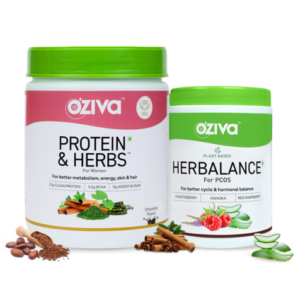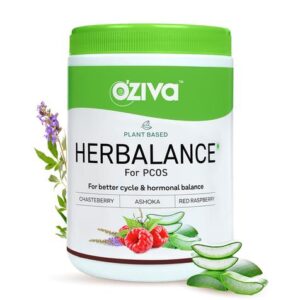PCOS or Polycystic Ovary Syndrome is a painful endocrine metabolic disorder where women develop multiple cysts in their ovaries. This leads to hormonal changes, particularly androgen production, which in turn, leads to male tendencies (both externally and internally).

Androgen is a hormone that develops and maintains male characteristics. When women start secreting androgen, it results in excessive body or facial hair or even hair loss. Others have reported suffering from irregular menstrual cycles, acne, mood swings, etc. PCOS could also lead to weight gain.
While none of the PCOS symptoms are life-threatening, they do result in inconvenience and could lead to emotional and mental upheaval. Having sparse facial hair or a heavy voice isn’t likely to cause any hazardous health issues but it deeply questions one’s mental capacity. Many people turn to Ayurveda for PCOS, thinking natural remedies will help cure the condition. But is it actually effective? If not, how to cure PCOS? Or most importantly, is PCOS curable at all?
“Currently, a large number of women are detected with PCOS. It is a common problem seen in the women of reproductive age group. Thus, it is the need of the hour for women with PCOS to embrace a healthy lifestyle and stay in top shape,” says Dr Preethika Shetty, Consultant Obstetrician & Gynaecologist, Motherhood Hospitals, Kharadi.
If you wanna treat your PCOS from home and are looking for natural remedies, here are 5 easy lifestyle changes that you would wanna consider.
All About PCOS!
PCOS is a health condition in women that results in the unwanted development of male characteristics. The precise cause of PCOS isn’t known yet – however, as per medical professionals, it’s a state where the body fails to produce and utilise insulin. As a result, women undergo the counter effects of hormonal changes. But the question still stands: How can we cure PCOS?
To start with, regular exercise and morning/evening jogs may prove to be helpful for women with PCOS. Losing weight is one of the fundamentals if you want to treat PCOS at home. Obese women are more likely to suffer from the ill effects of PCOS, as per reports. Also, incorporating a healthy diet and performing workouts; doing yoga asanas and eliminating stress will help treat the condition at home.
What Causes PCOS?
As aforementioned, the exact cause of PCOS isn’t discovered yet but it’s reported to have a direct link with the failed production of insulin in the body. However, several other factors are responsible for the condition as well. These include:
Higher secretion of male hormones (androgens):
When there’s a higher production of male hormones in a woman’s body, it prevents the occurrence of female tendencies. Consequently, women experience irregular or delayed menstruation. High androgen levels prevent ovulation. Ovulation is a process wherein the ovaries (female reproductive organs) release eggs, which initiates menstruation. Irregular periods are also reported to cause tiny sacs to grow in the ovaries. Besides, high androgen production results in acne breakouts and a heavier voice in females.
Insulin resistance:
Increased insulin resistance suppresses ovulation, which contributes to the symptoms of PCOS. Insulin helps produce glucose (sugar), which the body utilises for energy. This implies if the body undergoes insulin resistance, it would lead to high glucose levels in the blood. This, in turn, would lead to weight gain.
Low-grade inflammation:
Women suffering from PCOS tend to undergo low-grade inflammation. If you experience chronic low-grade inflammation, consult a healthcare professional as this is something that cannot be treated at home. You will need to get some blood tests performed to measure the levels of white blood cells and C-reactive protein (CRP).
Can PCOS Be Cured?
Because the root cause of PCOS has not been uncovered yet, researchers find it difficult to provide a prominent diagnosis. However, bringing about certain lifestyle changes may help combat PCOS. Working out regularly; maintaining healthy sleep hygiene; consuming a balanced diet and taking PCOS supplements may prove to be actively beneficial. Here are 5 easy-peasy lifestyle changes that you may incorporate to treat PCOS at home:
1. Healthy diet
A balanced and healthy diet plays a crucial role in reducing the symptoms of PCOS. Avoid the consumption of sweets or high-calorie food. Eat smaller quantities of meals during the day. Don’t snack in between. Also, bear in mind, breakfast is the most important meal of the day – hence, never miss out on it. Always eat a protein-rich breakfast packed with essential nutrients and vitamins. You may also wanna pop in a PCOS supplement after you’re done with your breakfast.
For lunch, have something fibrous and healthy. Fibre-rich food catalyses metabolism, which eases digestion, and helps with weight loss. Add fresh fruits, green leafy vegetables, pulses, lentils, whole grains, et al to your diet. Avoid the intake of oily, junk, canned and spicy food that may interfere with your digestion. Drink enough water and stay away from sodas and colas.
2. Stress-free lifestyle
Ensuring a stress-free lifestyle will help soothe the mind and improve the functioning of the body. While it is difficult for patients with PCOS to not think about what’s wrong with them, take time away from the madding crowd. Do something that’s fun and initiates a mode of relaxation. Yoga and Pranayamas are excellent ways to lose weight and burn stubborn fat. Further, induce fresh ideas and focus on a new outlook in life. To help deal with stress and anxiety, you may also meditate. Guided meditations yield the best results. Just remember to take things slow and enjoy life!
3. Reduce carbohydrates and sugars
If you wanna treat PCOS, carbohydrates and sugars are your worst enemies. The consumption of carbs and sugar results in insulin resistance, which is directly associated with PCOS symptoms. A reduced intake of sugary products and carbohydrate-rich foods will keep your blood glucose levels in check. This will lead to weight loss. Hence, consume a diet low in simple carbohydrates and sugar. Instead, eat healthy carbohydrates, such as lean meat, fish, vegetables and fruits.
4. Supplementation
PCOS supplements for women not only help combat the signs and symptoms of PCOS but also add nutritional value to the body. However, bear in mind, not all nutritional supplements available in the market are regulated by the Food and Drug Administration (FDA). And so, they may cause some unwanted health conditions. Hence, before taking any supplementation, read the label of the product thoroughly. Also, conduct with a healthcare professional.
OZiva HerBalance PCOS is a PCOS supplement that’s safe and effective in managing the signs and symptoms of the condition. It is rich in chromium, selenium, vitamin D, calcium, inositol, and contains 21 plant-based wholefoods such as Shatavari, Red Raspberry and Ashoka to help reduce and manage PCOS symptoms.
5. Manage Weight
Women with PCOS may suffer from excessive weight gain, and over time, become obese. If you don’t manage weight effectively during PCOS, this may lead to many health problems, such as type 2 diabetes, heart diseases, and even infertility. Hence, it’s significant to consume a healthy diet low in calories and bad fat. As mentioned earlier, eat in smaller quantities instead of larger meals. Portion size plays a vital role in losing weight.
How is PCOS diagnosed?
Yes, PCOS can be diagnosed. However, there isn’t one test that can examine whether or not an individual has the polycystic ovarian syndrome. Many don’t realise they have the condition until and unless they witness a drastic change in weight; mood fluctuations and frustration; pregnancy complications, among other symptoms.
Hence, it’s important to be aware of the signs and symptoms of PCOS and consult a professional. You will need to discuss these symptoms, the medications, and other medical conditions with your doctor.
- Talk to your healthcare provider about your medical history and symptoms
- Check your blood pressure and weight
- Perform a physical exam. This will help understand the reason behind the excessive facial hair growth/hair loss, acne, skin tags, or uneven skin.
- Perform a pelvic exam. This examines swollen ovaries or other unwanted growths in the uterus.
- Examine hormone and glucose levels.
- Perform a pelvic ultrasound to look for cysts.
If you are diagnosed with PCOS, your doctor might recommend more tests. These may include:
- Regular checks of blood glucose levels, blood pressure, cholesterol, triglyceride levels, and glucose tolerance.
- Examination for anxiety or depression
- Screening for sleep apnea
Conclusion
PCOS is a complicated condition without any scientific cure. While there are tons of traditional and alternative treatments that one may consider, bringing about just the right lifestyle changes can do wonders. Not only will it help reduce the complications associated with PCOS, but it can also eradicate the condition. It is advisable to stay in touch with healthcare professionals and address all the chaos and concerns that you encounter. Also, stick to a healthy, balanced diet and PCOS supplementation.
Read more about PCOS treatments here.
Last modified: January 27, 2023






